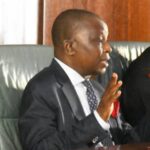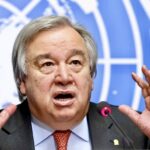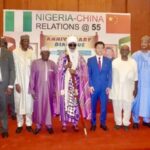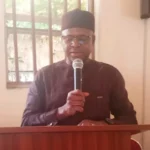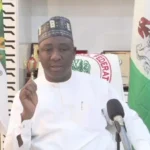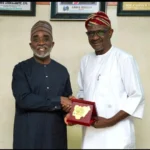By Salif Atojoko, News Agency of Nigeria (NAN)
When President Bola Tinubu’s administration clocked two years on May 29, he prided himself as having re-engineered the country’s economy and restored it to the part of recovery.
The President said that from the outset, his cardinal objectives, encapsulated in the Renewed Hope Agenda, were to tackle economic instability, improve security nationwide, reduce corruption, reform governance and lift Nigerians out of poverty.
The President gave himself a pass mark, proclaiming, “We have stabilised our economy and are now better positioned for growth and prepared to withstand global shocks.
“Inflation has begun to ease, with rice prices and other staples declining; the oil and gas sector is recovering; rig counts are up by over 400 per cent in 2025 compared to 2021, and over 8 billion dollars in new investments have been committed.
“In 2025, we remain on track with our fiscal targets; gross proceeds per barrel from crude oil are broadly aligned with our forecasts as we intensify our efforts to ramp up production.”
According to him, the country’s fiscal deficit has narrowed sharply from 5.4 per cent of GDP in 2023 to 3.0 per cent in 2024.
“We achieved this through improved revenue generation and greater transparency in government finances; in the first quarter of this year, we recorded more than N6 trillion in revenue.
“We have discontinued Ways & Means financing, which has been a major contributor to high and sticky inflation.
“The NNPC, no longer burdened by unsustainable fuel subsidies, is now a net contributor to the Federation Account; we are also achieving fuel supply security through local refining.”
He was emphatic that the country’s debt position was improving.
“While foreign exchange revaluation pushed our debt-to-GDP ratio to around 53 per cent, our debt service-to-revenue ratio dropped from nearly 100 per cent in 2022 to under 40 per cent by 2024.
“We paid off our IMF obligations and grew our net external reserves by almost 500 per cent from 4 billion dollars in 2023 to over 23 billion dollars by the end of 2024.
“Thanks to our reforms, state revenue increased by over N6 trillion in 2024, ensuring that subnational governments can reduce their debt burden, meet salaries and pension obligations on a timely basis, and invest more in critical infrastructure and human capital development.”
Perhaps, that is just a snippet of the broad assessment by the President of the achievements of his administration.
Experts, home and abroad share his view that the dark days are truly behind, and that Nigerians are beginning to look ahead into the future with optimism.
Indeed, this optimism resonates across the globe, with the World Bank and the International Monetary Fund (IMF) both acknowledging that the Tinubu administration has within a space of two years restored the country to the path of growth.
For instance, the World Bank projects that Nigeria’s economy will grow by 3.6 per cent in 2025, building on a 3.4 per cent growth in 2024, attributing the growth to macroeconomic reforms that are stabilising the business environment.
As far back as November 2024, the IMF had stated that the reforms introduced by the Tinubu administration were working and producing the desired outcomes.
Kristalina Georgieva, the Managing Director of IMF, on the sidelines of the 2024 G20 Leaders’ Summit in Rio de Janeiro, Brazil, commended Tinubu on the reforms introduced by his government.
The IMF boss noted that the reforms were very strong and very difficult to implement and was pleased that the government had been able to sustain them.
She had concluded that the reforms were effective and that the benefits were beginning to be felt by Nigerians.
Mr Wale Edun, the Minister of Finance and the Coordinating Minister of the Economy, at the World Bank/IMF 2025 Spring Meetings in Washington D.C., also affirmed that Nigeria was on the right track.
He said this affirmation came even before Fitch moved the credit rating of Nigeria from B minus to B, with a positive outlook.
The minister stated that the IMF also said Nigeria’s resilience, created by the macroeconomic reforms, had stabilised the economy, and that it enabled the country to cope with the introduction of reciprocal tariffs in America and the turbulence that it caused.
He added that at the World Bank annual meetings, many leading financiers, leaders, and multilateral institutions expressed support for Nigeria’s ongoing reforms.
Nigerians themselves are now aligning with the positive global assessment of the performance of the Tinubu administration at mid-term.
Dr Chinyere Almona, Director-General, Lagos Chamber of Commerce and Industry (LCCI), agreed that Tinubu’s bold macroeconomic reforms had corrected long-standing structural distortions.
She noted that two years into the administration, Nigeria had undergone significant policy shifts—most notably, the removal of fuel subsidies, exchange rate liberalisation, and attempts to shore up public revenues through tax reforms.
Similarly, Mr Kola Adesina, the Managing Director of Sahara Group, hailed President Tinubu’s energy sector reforms, which he said had improved transparency, regulatory consistency and expanded investment opportunities.
He said Tinubu’s courage in removing the fuel subsidy and market distortions had enabled businesses and policymakers to plan more confidently and clearly.
“The energy sector today is stronger and more sustainable. We can now plan; the macro and micro elements are beginning to work together, and there’s strong potential for long-term benefits,” Adesina said.
The price of petrol, which rose to between N1,200 and N1, 400 in different locations across the country in the heady days of fuel subsidy removal, has reduced to between N875 and N890, with scarcity and queues at petrol stations becoming a thing of the past.
In the power sector, the Tinubu administration has resolved long-standing financial obligations, with payment of legacy debts, which will enable new investors to come in, and existing ones to deepen their investments.
The government’s energy transition, driven by a focus on natural gas and climate-conscious solutions, gas-to-power initiative, is gaining ground.
“CNG is now the order of the day – the President has made that a focal point; the carbon credit scheme is also expanding,” Adesina said.
He said the Tinubu administration’s efforts in the last two years represented a solid foundation for Nigeria’s future, and that the current energy landscape was anchored on reliability, accessibility and affordability.
One of Tinubu’s most impactful achievements is believed to be his bold tax reform.
By the end of 2024, the country’s tax-to-GDP ratio rose from 10 per cent to over 13.5 per cent, a remarkable leap in just one year.
Experts say this is a result of deliberate improvement in tax administration and policies designed to make the tax system fairer, more efficient and more growth-oriented.
They say the administration has eliminated the burden of multiple taxation, making it easier for small businesses to grow and join the formal economy.
The tax reform is said to be geared towards protecting low-income households and supporting workers by expanding their disposable income.
Essential goods and services such as food, education, and healthcare will now attract 0 per cent VAT. Rent, public transportation, and renewable energy will be fully exempted from VAT to reduce household costs further.
Another indication that the Nigerian economy has turned the corner, according to experts, is the robust performance of the Nigerian Exchange (NGX), considered as the barometer with which the economy is measured.
Mr Omoniyi Akinsiju, the Chairman of the Independent Media and Policy Initiative (IMPI), said almost all the companies that recorded losses in the first quarter of 2024 were back to profit-making, as shown in their respective first-quarter 2025 balance sheets.
He said the listed loss-making companies and others had witnessed a rebound, and did not just record profits, but impressive profit margins,
“This is a clear indication of the impact of the Tinubu administration’s economic reforms.”
Akinsiju also highlighted the country’s progress in economic diversification, noting that the policies deployed by the Tinubu administration increased Nigeria’s non-oil exports to 1.791 billion dollars in the first quarter of 2025, up 24.75 per cent from the same period last year.
“The Nigeria Export Promotion Council (NEPC) said that 197 products, including cocoa, fertiliser, cashew, and sesame seeds, were exported in the first quarter of 2025; this marks an increase from 162 products in the first quarter of 2024.
“The extension to this is the increase in regional exports to ECOWAS countries to 223.10 per cent, from 19.5 million dollars in Q1 2024 to 63.06 million dollars in Q1 2025, while intra-African trade reached 32.73 million dollars,” he said.
Dr Dele Alake, his Solid Minerals Development Minister, said Nigeria’s solid minerals sector attracted over 800 million dollars in processing projects in 2025.
Alake said the revenue generated was driven by the Tinubu administration’s new policy of local value addition and a tightened licensing regime.
The minister said the sector also generated over ₦38 billion in revenue in 2024, up from just ₦6 billion the previous year, despite receiving only 18 per cent of its ₦29 billion budgetary allocation.
In the area of security, amid the new security challenges, observers say the Tinubu administration has recorded some successes.
Just like Tinubu said in his statement to mark his administration’s second anniversary, the armed forces had restored order in some areas of the North-West hitherto under the control of bandits, reducing and eliminating threats to lives and livelihoods.
“With the success achieved, farmers are back tilling the land, and highways, hitherto dangerous for travellers, have become safer, the President said.
After two years in the saddle, it is stakeholders’ consensus that Tinubu’s Renewed Hope Agenda has delivered tangible dividends and hope for a sustainable growth.(NANFeatures)
***If used, please credit the writer and the News Agency of Nigeria.

